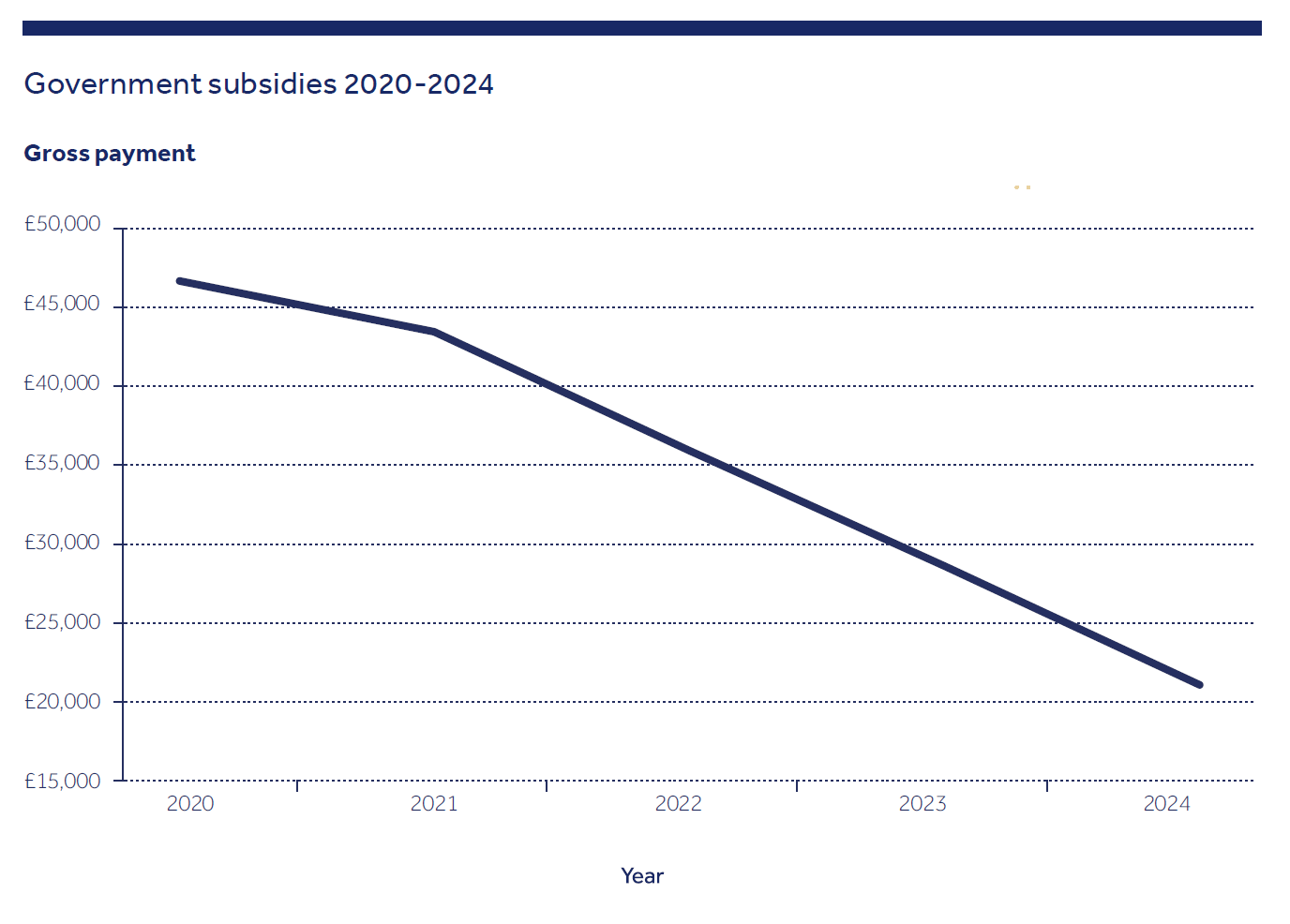The agricultural transition
The payments will be cut 50% by 2024, rising to 70% in the same year for the largest claims and will have been completely phased out by 2028. Over this period farmers will have to adapt to these changes.

The above graph shows the reduction for a 200ha farm up until 2024.
If all factors remained equal over a third of farms in England would make a loss without the BPS.
To help farmers and other land managers with the transition the Government has created the Environmental Land Management Scheme (ELMS). This is broken down into three separate schemes: The Sustainable Farming Incentive, Local Nature Recovery and Landscape Recovery. These schemes are intended to support the rural economy while also helping to achieve the Governments 25-year environmental policy and help towards the commitment of being net-zero by 2050.
As a result of these schemes, farmers and other land managers may enter into agreements to be paid for delivering the following:
• clean and plentiful water
• clean air
• thriving plants and wildlife
• protection from environmental hazards
• reduction of and adaptation to climate change
• beauty, heritage and engagement with the environment
The Sustainable Farming Incentive will pay farmers to manage their land in an Environmentally sensitive way. This is the scheme which we expect farmers to have the largest engagement with and also the scheme which will probably have the largest impact on the farmed landscape. The scheme includes plans such as decarbonising agriculture by encouraging farmers to reduce the use of nitrogen fertilisers and to improve water management by, for example, encouraging farmers to use buffer strips.
There is currently an ongoing pilot of The Sustainable Farming Incentive. It is expected that some parts of this scheme will be launched in 2022 and that a full national launch will be sometime before the end 2024.
But what can farmers do in the meantime to mitigate this reduction in BPS?
We believe that if you engage with the Countryside Stewardship Scheme (CSS) in quite a big way then this can help to offset this initial reduction in the BPS, and we have indeed encouraged many of our clients to join this existing scheme.
This has a dual outcome. First, it helps to diversify farm’s income from production of the traditional agricultural commodities. Secondly, it helps to prepare our clients and farmers for the successful delivery of other agri environmental schemes, especially as these schemes will become increasingly striving and more mainstream as we move forward, take for example ELMS.
Although the CSS mayhelp to mitigate the initial blow from the removal of BPS and help to diversify farmers earnings, some farmers may still receive less income than they previously did.
Farmers have always had to be efficient, but when farm income is being reduced it emphasises the importance of efficiency within agriculture.
Efficiency within agriculture does not simply mean just cutting costs, it means carrying out a full analysis of a farm’s current systems and seeing where costs will be best spent. An example of this which links to CSS is that on some farms there could be fields which will provide more benefits to the farm by being removed out of crop production and instead, say, become a field of winter bird food (AB9) or nectar flower mix (AB1).
Another grant has also just been released called the Farming Investment Fund. This is split into two parts; the Farming Transformation Fund and the Farming Equipment and Technology Fund. The Farming Transformation Fund will see capital grants of between £35,000 and £500,000 on offer to help farms improve profitability, productivity and environmental sustainability. The Farming Equipment and Technology Fund will provide grants of between £2,000 and £25,000 towards the cost of equipment and technology to help improve the productivity of a farm in a sustainable way.
There may be some challenges ahead for farmers and land managers, but with careful planning and utilising the funding that will be available, farming business will be able to adapt and overcome.

























